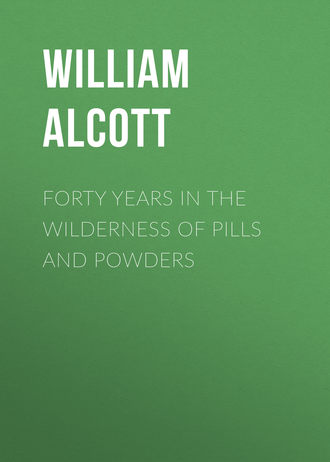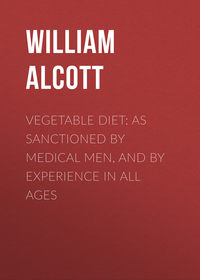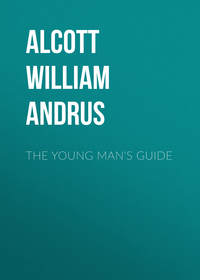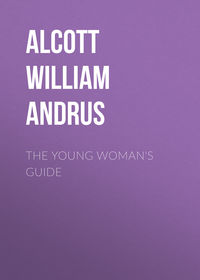
Forty Years in the Wilderness of Pills and Powders
William A. Alcott was born in Wolcott, Conn., August 6th, 1798. His father, a farmer in the rough mountain town, employed his son, as soon as he was old enough to be useful, in laboring on the farm, so that, from childhood, he was trained to habits of industry. His early employments were, in many respects, beneficial, and his feeble constitution was probably invigorated by this out-of-door work. The only apparent drawback was being kept at work too closely, with very little time left for amusement; and, as he was too conscientious to neglect the tasks assigned him, he plodded on, thus losing, in a great measure, while young, the natural and healthy relish of boys for athletic games and sports. As a natural consequence, his mind developed too rapidly. He early showed a great fondness for books, and the love of reading came to be his chief and almost only amusement.
Till eight years of age he attended the district school, in summer and winter, but after this period his father employed him in farm labor constantly, except during the winter term. At the age of fourteen he had measles, from which he suffered greatly at the time, and in its consequences for several years. He grew rapidly, was, when a lad, tall and thin, and his strength, when young, and, indeed, through his whole life, lay chiefly in a strong will, combined with great energy and perseverance. To these qualities, doubtless, is owing the continuance of his life for many years.
When little more than eighteen years of age, he commenced teaching, which was continued, during the winter, for several years; sometimes through the entire year. But a strong desire to improve and elevate the schools, led him to overtask himself. Mr. Barnard's Journal of Education, speaks thus of his labors at this period: "The severity of his exertions and self-denials, joined to other causes, especially a feeble constitution, brought on him a most violent attack of erysipelas, from the effects of which, though he escaped with his life, he never entirely recovered."
About this time he commenced the study of medicine, and the succeeding winter, 1825-6, attended medical lectures in New Haven, not so much with the design of making it a profession, as with the hope that it might prove an aid in fitting him to become a more thorough teacher. The following March he received a license to practice medicine and surgery. But his health was far from being good, and he was, himself, more apprehensive of a fatal result, than consumptive people usually are.
However, he soon found an opportunity to engage in teaching again, and embraced it eagerly. But here he was destined to disappointment. His pulmonary tendencies, which had for ten years been increasing upon him, aggravated, no doubt, by hard study and improper diet of the preceding winter, now became very alarming. Beside a severe cough and great emaciation, he was followed by hectic fever, and the most exhausting and discouraging perspirations. He fought bravely to the last moment, but was finally compelled to quit the field, and endeavor to regain his health.
For a time, he followed the soundest medical advice he could obtain; kept quiet, took a little medicine, ate nutritious food, and when his strength would permit, breathed pure air. This course was at length changed, for one of greater activity and less stimulus. He abandoned medicine, adopted for a time the "starvation system," or nearly that, and threw himself, by such aids as he could obtain, into the fields and woods, and wandered among the hills and mountains.
In autumn, he was able to perform light horticultural labors, a few hours of the day, and to ride on horseback. For six months he rode almost daily in company with a physician; at the end of which period he commenced the practice of medicine, in the place where he had last labored, and where he was born.
After continuing in the practice a few years, and his health seeming to be restored, he ventured to return again to the work dearer to him than any other – that of teaching. But his labors seemed again to be slowly undermining his health, and, fearful of a relapse of the pulmonary tendencies, he abandoned for a time all hope of teaching permanently.
The following year, he became connected with Rev. William C. Woodbridge, and continued to labor in the cause of education for several successive years.
In Jan. 1833, he removed to Boston, and during the winter had a severe attack of bleeding at the lungs, and other dangerous symptoms. These, however, passed away; and the great change which, in 1830, had been made in his physical habits, seemed to be working one equally great in his constitutional tendencies. For while his labors were constant and often severe, there was a steady gain in health. The strength and elasticity of youth returned, and, to use his own words it was with him, now, "morning all day." The effects of an unfavorable climate, which he had feared, were apparently held in check, and he sometimes said that "Obedience gave him command over climate, in a great degree." Yet, during all these years when his health was apparently most firm, it was kept in this condition only by a rigid obedience to the laws of life and health, as he understood and expounded them. His precepts and practice were in harmony.
In the spring of 1848, owing to some unusual exposure, a return of the cough and other symptoms of his old disease made their appearance.14 But, with care, and light labor in the garden, they gradually passed away, and his usual measure of health returned, and continued, with slight interruptions, till 1855. During this year he was confined to his room several months with a broken limb. The change, at his age, from exercise daily in the open air, to confinement without exercise nearly all winter, was very unfavorable, in its results, to his general health. The lungs, doubtless, suffered greatly, and were never able to resist, as before, the effects of exposure to sudden changes of temperature.
Still he labored on from year to year, untiringly as ever, writing, lecturing, visiting schools, etc. During the last winter, his time was employed more exclusively in reading and writing, and he went out less than usual. His lungs were weak and very easily affected. A difficulty of breathing after much exertion was frequent. His feet and ankles were often much swollen, and there was a loss of strength and general debility quite new to him.
These indications were not to be mistaken, and in the retirement of his own home he often spoke of the possibility and even probability, that his earthly labors were drawing to a close.
On the 18th of March, he left home to be absent a few days, partly with the hope that being more in the open air might prove beneficial. On Friday of the following week, though scarcely able to be moved, he was brought home, having been prostrated by what appeared to be a violent attack of pleurisy, which terminated his earthly existence, on Tuesday, March 28, 1859.
In many minds the question will naturally arise: What should induce such an apparently violent disease, in a person who so rigidly obeyed the laws of health? A satisfactory answer to this can be given only by supposing the acute disease to have been merely a finishing up or termination of that disease which for years had been held in check. His own views on the subject were in accordance with this conclusion, and the condition of the lungs, as shown by a post mortem examination, served to confirm it. The amount of disease found in the lungs was so great that the examination could not be as careful and satisfactory as would have been desirable.
The hand that wrote this volume, and that would have drawn important lessons from this page of life, now moulders in the dust. To the reader it is left to gather from it instruction and motive and courage, for a like battle against evil, for a like victory over self, until he, too, shall accomplish his mission upon earth.
1
To illustrate this point, and show clearly the state of the public opinion, I will relate an anecdote. A certain calf in the neighborhood, after long and patient trial, was pronounced too ignorant to be able to procure his own nourishment, or in other words, was said to be a fool. On raising the question, what should be done with him, a shrewd colored man who stood by, said, "Master, send him to college!"
2
Of the hydropathist at that time I had not heard.
3
Dr. Livingstone, in his work of Travels and Researches in Africa, tells us that during his residence among the Backwains, a tribe in the African interior, two persons who had been hastily buried, perhaps "struck with death" in the first place, returned home "to their affrighted relatives." p. 143.
4
See Chap. VIII.
5
Even such inquiries as these are usually of doubtful tendency. They weaken public confidence. There must be but one opinion of any value to the physician or his patients, and that must be his own!
6
Farmers, in former times, while making cider, were very slovenly. When I observed a large amount of filth adhering to their boots and shoes as they carried the pumice from the vat to the press, I thought of the worms, insects, and dust, which were ground up and incorporated with the mass, I sometimes expressed surprise. "Oh," said they, "the cider will work itself clean!" If so, I thought, and still think, it must be by the operation of some law not yet discovered. It may work itself clear, perhaps; but to work itself clean, is quite another matter.
7
This error has been met and refuted in the happiest manner, by the late lamented Dr. John C. Warren, of Boston, in his little work, entitled, "Hints for the Preservation of Health." Also, by Dr. Alcott's new work, "The Laws of Health."
8
Since this was penned, the young woman has died of erysipelas. Can it be that she has been compelled, in this form, to pay a fearful penalty for her former abuses? One might think that twenty years of reformation would have worn out the diseased tendencies. Perhaps she recurred, in later years, unknown to the writer, to her former favorite article.
9
She was not aware that king's evil, or scrofula, is oftentimes the parent of consumption.
10
Since this chapter was written, I have had the pleasure of learning from a reliable source that the young woman above referred to is now enjoying comparatively good health. She married a second time, a year or two afterwards; and by following out the course prescribed, and with the blessing of Heaven, she came at length to her present position of usefulness and happiness.
11
For obvious reasons, I give real names and dates in this chapter.
12
Even Mr. Graham himself, whom he accidentally met, repeated to him the same caution!
13
Or other fruits equal to them. The reader must not forget that she had already subsisted five years without animal food, and that what she took of vegetable food was a very small quantity – little more than was taken by Mr. Robinson.
14
See Chapter LXIX.





